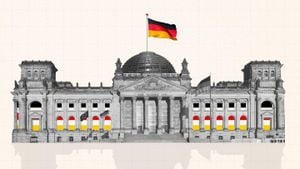Former U.S. President Donald Trump has stirred controversy with his recent statements questioning the importance of Ukrainian President Volodymyr Zelensky's role in peace negotiations aimed at ending the conflict with Russia. Speaking on Fox News Radio, Trump asserted, "If I'm honest, I don’t think his presence at the meetings is very important. […] Zelensky has conducted meetings for the last three years and still hasn't managed to end the conflict." This sentiment reflects Trump's view on the inefficacy of Zelensky's negotiation efforts, indicating discontent with how the war has unfolded.
Trump's remarks, which have sparked reactions not just within the U.S. but also from officials in Kiev, come against the backdrop of heightened tensions between the United States and Ukraine. Previously, Trump claimed, “Every time I say, ‘It's not Russia’s fault,’ I get criticized by fake news, but I’m telling you, Biden said the wrong things, Zelensky said the wrong things.” This blame game highlights Trump's belief in the missed opportunities for peace and the escalation of the conflict.
During interviews, Trump has also referred to Zelensky as lacking “cards” in the negotiation process, implying the current Ukrainian leadership lacks leverage and strategic power to effectively negotiate. “The current Ukrainian leaders have no cards at the negotiating table aimed at ending the war,” he stated, reinforcing his argument for direct U.S. engagement with Russia
Trump's comments came just after significant talks involving U.S. and Russian representatives held recently in Riyadh, a meeting which Zelensky and European allies were not invited to. This exclusion has fueled concerns among European nations about their relevance and participation in the negotiation process, as articulated by various diplomats.
Adding to the complexity of the situation, Trump's harsh criticism of Zelensky aligns with his promotion of potential deals involving U.S. investments in Ukrainian mineral resources. Reports have emerged indicating plans for Ukraine to enter agreements with the U.S. concerning rare earth minerals, which may be part of Trump's strategy to bolster American interests abroad. Mike Waltz, White House National Security Advisor, mentioned at the Conservative Political Action Conference, “Zelensky will sign this deal, and you will see it very shortly,” hinting at the urgency behind such negotiations.
Ukrainian officials have protested against the backdrop of Trump's comments. Mykhailo Podolyak, advisor to President Zelensky, responded to the situation, stating, “We were surprised by the strange and irrational statements coming from Washington which are definitely unfair.” This response reflects the depth of concern within Ukraine about the stability and support from their allies, especially as negotiations evolve.
Trump's assessment of Zelensky as "a dictator without elections" and calls for elections to be held within Ukraine indicate his larger intention to reshape the narrative surrounding the leadership capabilities and legitimacy of Ukrainian officials. This perspective is echoed by some within the U.S. political sphere who believe leadership changes may bring fresh approaches to negotiations.
The stakes are high as the international community continues to observe the dynamics between Trump’s administration, Ukraine, and Russia. Trump's rhetoric suggests he is eyeing a more direct approach to dealing with the Kremlin, pushing for talks without what he perceives as ineffective leadership on the Ukrainian side.
The ramifications of Trump's comments are manifold. Should he regain the presidency and pursue negotiations without Zelensky’s involvement, it could fundamentally alter the framework under which peace talks are conducted. Observers from both sides of the Atlantic have expressed anxiety over being sidelined from negotiations, with varying opinions on how best to proceed to bring stability back to Ukraine.
Overall, as the international debate intensifies around the war, Trump's criticisms of Zelensky could resonate with certain political factions at home and abroad, potentially reshaping diplomatic conversations. The coming months will certainly test the resilience of Ukraine's diplomatic relationships as they navigate both external pressures and internal expectations.



